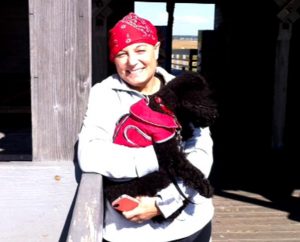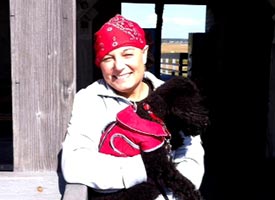Maggie Karner, director of LCMS Life and Health Ministries, has written a commentary that addresses the plan of terminally ill newlywed Brittany Maynard to “die on her own terms” by taking assisted-suicide drugs that will end her life. (See People.com story.)
Like Maynard, Karner has an aggressive brain tumor that will likely kill her. But unlike Maynard, Karner has no plans to die by her own hand.
Karner’s commentary, “Brain Cancer Will Likely Kill Me, But There’s No Way I’ll Kill Myself,” appears in The Federalist, a web magazine that focuses on culture, politics and religion.
As she watched Maynard’s video (part of an online campaign with Compassion & Choices, a pro-euthanasia special-interest group), Karner says she “wanted to hug Brittany and shed tears right along with her because I, too, know those fears. I was also diagnosed this past spring with a stage-four glioblastoma multiforme brain tumor.”

Karner says she identifies with Maynard’s “spunky” spirit and love of travel, as well as her “prognosis of future suffering. Some days are joyful. Some days the diagnosis feels like a huge weight in my backpack.
“The hardest part of a terminal diagnosis is not knowing the timeline. I speak candidly with my physicians and pray that they can keep my tumor under control with the latest therapies to extend my life one more year, month, day.”
As Karner notes, Maynard and her family moved to Oregon earlier this year to have legal access to physician-assisted suicide and to receive a prescription for the drugs she plans to use to end her life within days after her husband’s Oct. 26 birthday. Maynard “refuses to refer to her decision as an act of suicide, even though she will, quite literally, take her own life,” writes Karner, adding that “assisted suicide … has been redefined into the more euphemistic ‘aid in dying’ or sometimes ‘death with dignity’ ” by proponents such as Compassion & Choices (previously known as The Hemlock Society).
“However well-intentioned, this is one area where the old adage that ‘Hard cases make bad law’ comes into play,” she writes, and she quotes Marilyn Golden, a senior policy analyst for the Disability Rights Education and Defense Fund, who warns that “assisted suicide is not progressive, in fact, it puts many vulnerable people at risk, and we have already seen examples of that where it is legal.”
Says Karner: “Maynard can choose to call her act anything she wants to enable her to feel better about her decision, but that doesn’t change the facts about how she has chosen to die.”
Karner writes of her quadriplegic father who “wasn’t productive in any meaningful way” for the last five months of his life. Still, she and her siblings found his life valuable and “soaked up” his presence, “realizing that caring for the needy person we loved so dearly showed each of us some unexpected things about ourselves.”
That experience, she says, “will serve me now as I face my own debilitating mortality. Death sucks. And while this leads many to attempt to calm their fears by grasping for personal control over the situation, as a Christian with a Savior who loves me dearly and who has redeemed me from a dying world, I have a higher calling. God wants me to be comfortable in my dependence on Him and others, to live with Him in peace and comfort no matter what comes my way.
“As for my cancer journey, circumstances out of my control are not the worst thing that can happen to me. The worst thing would be losing faith, refusing to trust in God’s purpose in my life and trying to grab that control myself.”
Karner said she prays that Brittany Maynard “changes her mind and decides to allow others to care for her in her illness.
“I feel blessed that my tumor came later in my life (I’m 51) and I have had the gift of raising three lovely daughters. I want my girls to learn servanthood and selflessness as they care for me. And I also want them to know that, for Christians, our death is not the end. … Christ’s resurrection from that borrowed grave confirms that death could not hold Him, and it cannot hold me either — a baptized child of God!”
As director of LCMS Life and Health Ministries for the past 10 years, Karner has spearheaded LCMS sanctity-of-life programs, education opportunities and resources. She served as editor of Notes for Life, a quarterly electronic newsletter, frequently wrote about life issues and chaired the LCMS Sanctity of Human Life Committee.
She also supports and promotes LCMS life and health mercy outreach projects in the United States and abroad, overseeing the Synod’s international mercy medical teams and more than 400 LCMS parish nurses nationwide, and has been instrumental in the formation and LCMS sponsorship of women’s caring pregnancy centers in Russia and Malaysia.
Karner is married to the Rev. Kevin Karner, an LCMS pastor, and works part time from her home office in Bristol, Conn. She plans to step down from her LCMS position in January to spend more time with her family.
Posted Oct. 10, 2014 / Updated Oct. 13, 2014
